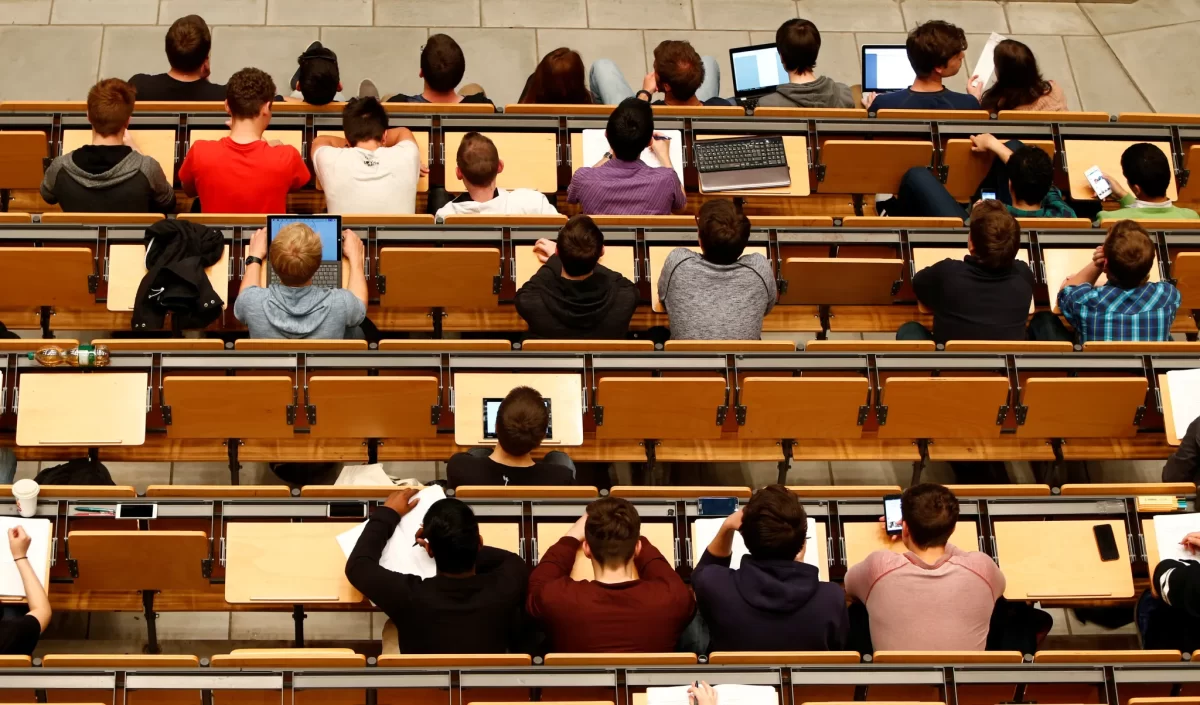It’s a scene every Fordham student is familiar with — you’re in the middle of class, the professor is lecturing from the slides and you look around the room and realize not a single student in the class is paying attention to what the teacher is saying. Instead, everyone’s laptops are open. One student is watching TV with the subtitles on. Another is Amazon shopping. Some students — the most productive ones — are doing homework for other classes.
I’ll avoid the temptation to go on a rant about “kids these days,” and launch into a tirade about Gen Z are a bunch of spoiled kids who can’t pay attention. In truth, computers make it hard to focus for anyone, regardless of age. Even students who want to stay dedicated and focused can succumb to the temptation right at their fingertips. Maybe you mean to be taking diligent notes, but then you notice a text message from a friend pop up in the corner of the screen. Or see an email you’d be meaning to respond to. Or have an idle question (what’s a group of porcupines called?), and feel the sudden, uncontrollable urge to Google it. All of a sudden, the professor is dismissing class, and you haven’t heard a word that’s been said for the past hour.
That’s why, for the good of the education process, Fordham professors should ban laptops from their classrooms.
There are, of course, exceptions. Certain courses require computers for certain activities. Certain students may have a disability which means they require laptop use. But for the most part, unless students are doing something that explicitly requires Internet access, computers shouldn’t be open in the classroom. And no, note-taking doesn’t count as something that requires Internet access.
For all those people who argue that they take better notes on their laptops… you don’t. I hate to break it to you. Study after study has shown that writing out your notes on paper helps with comprehension and retention. Students who write down their notes are not only more likely to remember the information they’re writing, they are more likely to have a greater understanding of what’s being said. And since note-taking by hand is a slower process, it forces you to identify the important information to write down. By writing your notes instead of typing them, you’ll be doing yourself a huge favor come exam day. And, as an added bonus, there will be less distraction, forcing you to focus on what the professor is actually saying.
While some might argue that computers aid in student engagement, there’s little evidence to back this up. In a study conducted by Michigan State University, when researchers monitored student Internet usage during class, they found that the average student spent 40 minutes out of a 100-minute class on non-academic sites (social media, video games, etc). In contrast, the average student spent only five minutes using the Internet for academic purposes, such as looking at the syllabus. Furthermore, studies that have compared classes where electronics were allowed versus classes where they were banned have found that average grades rise when laptops are not used.
And it’s not only students that are actually using the laptop that can get distracted. Students sitting around someone who uses a laptop (even if they themselves are not) are invariably pulled away from the lecture. How many times have you found yourself entranced by a classmate’s computer screen? One study found that not only did students who used a laptop during class score lower on exams, the people sitting around them scored lower as well.
I’m not saying this will fix everything. Students’ minds will still be inclined to wander, and individuals will still find ways to distract themselves, be it by discreetly playing mobile games under their desk or sneaking a copy of the Ram to read (dare I to dream). But for many well-intentioned students, who want to focus but find themselves inevitably pulled away, a ban on laptop usage might serve to boost grades and focus.
I might be called a hypocrite for this article, because I, like so many of my peers, often use a laptop in the classroom. But I have also been in classes where computers were not allowed, and I have found that it was far easier to focus and be engaged in those classes.
In the years following Zoom, the educational world has held on to many of the digitized practices that arose out of necessity during virtual learning. As the pandemic recedes in our memories, however, it might be time to take a closer look at some of these things, and wonder how many of them are really necessary. In order to facilitate a better learning environment, Fordham professors should take the step of formally disallowing laptop use within the classroom without explicit permission.
(P.S. A group of porcupines is called a “prickle.” I just saved you a Google search.)
Michael Sluck, FCRH ’24, is a computer science and political science major from Verona, N.J.







































































































































































































